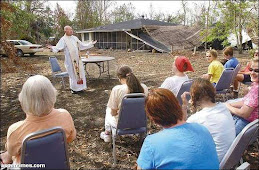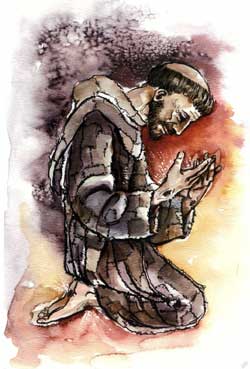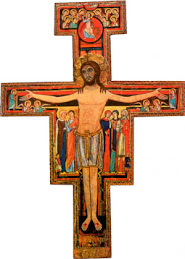National Catholic Reporter, April 7, 1995 by Pope John Paul II
The following are encyclical excerpts:
* On the new "culture of death": "This culture is actively fostered by powerful cultural, economic and political currents which encourage an idea of society excessively concerned with efficiency. Looking at the situation from this point of view, it is possible to speak in a certain sense of a war of the powerful against the weak. ... A person who, because of illness, handicap or, more simply, just by existing, compromises the well-being or lifestyle of those who are more favored tends to be looked upon as an enemy to be resisted or eliminated. In this way, a kind of `cospiracy against life' is unleashed."
* On artificial contraception and abortion: "The close connection which exists, in mentality, between the practice of contraception and that of abortion is becoming increasingly obvious. It is being demonstrated in an alarming way by the development of chemical products, intrauterine devices and vaccines which, distributed with the same ease as contraceptives, really act as abortifacients in the very early stages of the development of the life of the new human being."
* On abortion: "Procured abortion is the deliberate and direct killing, by whatever means it is carried out, of a human being in the initial phase of his or her existence, extending from conception to birth."
* On abortion's social context: "It is a most serious wound inflicted on society and its culture by the very people who ought to be society's promoters and defenders. ... We are facing what can be called a `structure of sin' which opposes human life not yet born."
* On the distinct human personhood of the fetus: "Modern genetic science offers clear confirmation. ... Furthermore, what is at stake is so important that, from the standpoint of moral obligation, the mere probability that a human person is involved would suffice to justify an absolutely clear prohibition of any intervention aimed at killing a human embryo. ... Human life is sacred and inviolable at every moment of existence, including the initial phase which precedes birth."
* Church teaching on abortion following a worldwide consultation with bishops: "By the authority which Christ conferred upon Peter and his successors, in communion with the bishops -- who on various occasions have condemned abortion and who in the aforementioned consultation, albeit dispersed throughout the world, have shown unanimous agreement concerning this doctrine -- I declare that direct abortion, that is, abortion willed as an end or as a means, always constitutes a grave moral disorder, since it is the deliberate killing of an innocent human being."
* Church teaching on murder: "By the authority which Christ conferred upon Peter and his successors, and in communion with the bishops of the Catholic church, I confirm that the direct and voluntary killing of an innocent human being is always gravely immoral."
* On infanticide: "Following this same logic (of eugenic abortion), the point has been reached where the most basic care, even nourishment, is denied to babies born with serious handicaps or illnesses. The contemporary scene, moreover, is becoming even more alarming by reason of proposals, advanced here and there, to justify even infanticide, following the same arguments used to justify the right to abortion."
* On euthanasia: "Threats which are no less serious hang over the incurably ill and the dying. In a social and cultural context which makes it more difficult to face and accept suffering, the temptation becomes all the greater to resolve the problem of suffering by eliminating it at the root, by hastening death. ... We see a tragic expression of this in the spread of euthanasia -- disguised and surreptitious or practiced openly and even legally."
* On capital punishment: "On this matter there is a growing tendency, both in the church and in civil society, to demand that it be applied in a very limited way or even that it be abolished completely. ... As a result of steady improvements in the penal system, such cases (where the death penalty is absolutely necessary) are very rare, if not practically nonexistent."
* On population control: "The pharaoh of old, haunted by the presence and increase of the children of Israel, submitted them to every kind of oppression and ordered that every male child born of the Hebrew women was to be killed. Today not a few of the powerful of the earth act in the same way. They too are haunted by the current demographic growth and fear that the most prolific and poorest peoples represent a threat for the well-being and peace of their own countries. ... Even the economic help which they would be ready to give is unjustly made conditional on the acceptance of an anti-birth policy."
* On anti-life policies on an international level: "We are in fact faced by an objective `conspiracy against life' involving even international institutions, engaged in encouraging and carrying out actual campaigns to make contraception, sterilization and abortion widely available. Nor can it be denied that the mass media are often implicated in this conspiracy, by lending credit to that culture which presents recourse to contraception, sterilization, abortion and even euthanasia as a mark of progress and a victory for freedom."
* On embryo experimentation: "The use of human embryos or fetuses as an object of experimentation constitutes a crime against their dignity as human beings who have a right to the same respect owed to a child once born, just as to every person. ... The killing of innocent human creatures, even if carried out to help others, constitutes an absolutely unacceptable act."
* On the meaning of euthanasia: "Euthanasia in the strict sense is understood to be an action or omission which of itself and by intention causes death, with the purpose of eliminating suffering."
* Church teaching on euthanasia: "Taking into account (various papally taught) distinctions, in harmony with the magisterium of my predecessors and in communion with the bishops of the Catholic church, I confirm that euthanasia is a grave violation of the law of God, since it is the deliberate and morally unacceptable killing of a human person."
* On assisted suicide and nonconsensual euthanasia: "Suicide is always as objectionable as murder. ... So-called `assisted suicide'... can never be excused, even if it is requested. ... The choice of euthanasia becomes more serious when it takes the form of a murder committed by others on a person who has in no way requested it and who has never consented to it. The height of arbitrariness and injustice is reached when certain people, such as physicians and legislators, arrogate to themselves the power to decide who ought to live and who ought to die."
* On civil and moral law: "Democracy cannot be idolized to the point of making it a substitute for morality or a panacea for immorality. Fundamentally, democracy is a `system' and as such is a means and not an end. Its `moral' value is not automatic but depends on conformity to the moral law. ... There is a need to recover the basic elements of a vision of the relationship between civil law and moral law, which are put forward by the church but which are also part of the patrimony of the great juridical traditions of humanity."
* Abortion and euthanasia as a violation of human rights: "Laws which legitimize the direct killing of innocent human beings through abortion or euthanasia are in complete opposition to the inviolable right to life proper to every individual; they thus deny the equality of everyone before the law. ... Abortion and euthanasia are thus crimes which no human law can claim to legitimize. ... There is a grave and clear obligation to oppose them by conscientious objection."
* What makes abortion and euthanasia new threats today: "It is not only that in generalized opinion these attacks tend no longer to be considered as `crimes'; paradoxically they assume the nature of `rights,' to the point that the state is called upon to give them legal recognition and to make them available through the free services of health-care personnel."
* What the gospel of life means: "The consequences of this gospel ... can be summed up as follows: Human life, as a gift of God, is sacred and inviolable. For this reason procured abortion and euthanasia are absolutely unacceptable. Not only must human life not be taken, but it must be protected with loving concern. The meaning of life is found in giving and receiving love, and in this light human sexuality and procreation reach their true and full significance.
* On new threats to life: "In addition to the ancient scourges of poverty, hunger, endemic diseases, violence and war, new threats are emerging on an alarmingly vast scale. ... A new cultural climate is developing and taking hold which gives crimes against life a new and -- if possible -- even more sinister character, giving rise to further grave concern: broad sectors of public opinion justify certain crimes against life in the name of the rights of individual freedom.
... Choices once unanimously considered criminal and rejected by the common moral sense are gradually becoming socially acceptable."
COPYRIGHT 1995 National Catholic Reporter
COPYRIGHT 2008 Gale, Cengage Learning
Bibliography for: "Excerpts from Evangelium Vitae"
Pope John Paul II "Excerpts from Evangelium Vitae". National Catholic Reporter. FindArticles.com. 28 Jul, 2009. http://findarticles.com/p/articles/mi_m1141/is_n23_v31/ai_16820194/
Venerable Gaetano Tantalo
-
Some weeks ago I visited an older parishioner in her home. As were were
chatting, I noticed pictures of two priests displayed in the room.
The priest on ...


















No comments:
Post a Comment